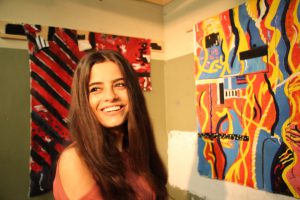
Wafa was arrested in 2011. The protests against the Assad regime had begun to heighten in frequency and intensity, with riots regularly breaking out in different Syrian cities. The Syrian authorities launched a nationwide crackdown on protesting in an effort to quell the rising dissent against the government, arresting many civilians. Amongst these were students who were dragged into prison for their activism, including Wafa Moustafa, now a BA1 student in the HAST program at BCB. “It was hard,” she says to me. “At this point, they didn’t arrest girls very often, so they had no idea how to deal with us appropriately.” After being beaten many times for disobedience, she decided that she would go on a hunger strike. But that, combined with serious asthma and an undiagnosed stomach condition, didn’t end well. “They summoned a doctor who force-fed me with syringes. Doctors here don’t help you, they’re all a part of the regime.”
In 2011, the world was hearing little about the situation in Syria. Despite warnings from the UN that Syria was headed for a full-blown civil war, the international community turned a blind eye to the nation. Entrenched in political chaos, the Syrians began to lead a different life. Wafa recalls that she couldn’t even visit her home village after a while because it had been taken over by supporters of the regime. “I used to go home every week, but suddenly my visits were restricted. They were suppressing anybody that opposed the regime, using any means possible. Sometimes this meant killing, but arrests and harassment was not uncommon.” The riots had turned what was originally a simple difference in opinion into a budding civil war. So often, we feel pressured to be eternally tolerant, but have we ever stopped to wonder what we are truly being tolerant of? “It’s not about different points of view,” she says in frustration. “This is not a political thing! This is life. It’s a moral thing, and your decisions reflect on who you are and what you really stand for.”
The arrests escalated as the government brought the full force of the authorities on the protestors. After her father was arrested, Wafa was forced to flee to Aleppo. “I couldn’t tell anyone anything. I would Skype with my mom but not tell her my location because, if she knew, they’d torture it out of her.” The situation was worsening. Schools began rejecting students on the basis of their political affiliation.
“I couldn’t go back to school.They knew I had been arrested for being a part of the protests. My name was publicly on a black-list, so I had to quit my education. Wherever you went, someone was trying to set you up. It was like we were surrounded by spies.” She continued protesting in full force and started traveling to different cities in Syria to join their protests, too. The revolts began to break out more frequently, one rising and dying every couple of hours: Like that, time ebbed away. “2012 was pretty quiet,” Wafa recalls. “But my friends and family slowly started disappearing. One would be killed, one would be arrested. People I loved were slowly dying.”
By this time, Wafa had been diagnosed with severe health issues. What she originally thought was a stomach condition turned out to be chronic anxiety and depression. Reeling from the shock of the diagnosis, she turned to protesting more in order to cope. But in 2013 the tipping point came. News surfaced that her best friend had died. Wafa recalls that they spent a great deal of time together and were very close.
“I’d always considered myself very strong, especially through the deaths of my close ones, but this was it. I broke.” Then came the downward spiral. “I didn’t leave the house for three months,” she says with a sigh. She spent extensive periods of time locked in her room, only ever leaving to use the bathroom — and that with the physical support of her father, who had since been released. “I couldn’t even walk. I had lost 8 kilograms and weighed a meagre 47 kilograms. I was so weak, and I thought that this was the worst thing that could happen to me… but then they came for my father again.”
“In the end, it was my father who made me see a doctor. He and I were always close and he knew that it was wrong for him to leave me like this. My family was in Damascus at the time and he promised me that I could see them if I got healthy again. But on July 2nd, they picked him up from our home. He was taken to some prison. I don’t know where he is, and I haven’t heard from him for three years.”
She says that her father once told her that if he was arrested, she had to flee immediately. “So we left. We fled to Turkey with nothing. No passports, no phones, no clothes in case we got stopped at the checkpoint. With the help of a connection, we found a place to stay, but now that I look back, it was the worst point of my life.”

Wow! Thank you Wafa and Tanya for sharing this!
Thanks for sharing this Wafa!
Thanks for sharing Wafa!
This is such an inspiring story. My heart goes out to you.